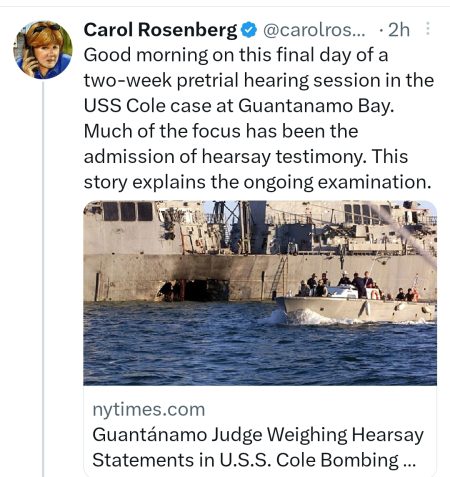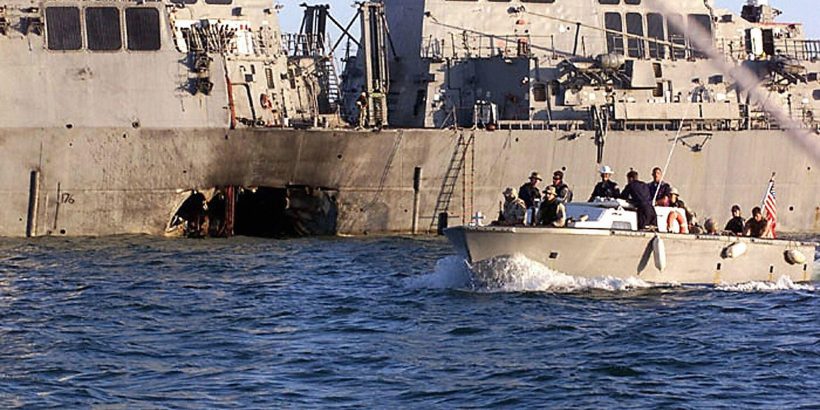March 3, 2023 – by Linda Forsythe
Today is the final day of a two-week pretrial hearing in the USS Cole case at Guantanamo Bay. This is another “Someday” proceeding that continues at a snails pace towards Tribunal.
Carol Rosenberg is in attendance at GTMO and encapsulates the discussions while reporting her observations on Twitter.
As a reminder and for context, Carol posted the following report which explains what these proceedings are about:

The Crime
The Saudi citizen Abd al-Rahim al-Nashiri is accused of organizing the Qaeda bombing of the U.S. Navy destroyer Cole on Oct. 12, 2000. Two men sailed a bomb-laden skiff alongside the Cole during a routine refueling stop in the port of Aden, Yemen, then blew themselves up. Seventeen American sailors died, and dozens more were wounded. Mr. Nashiri is also accused of a role in the 2002 bombing of the Limburg, a French-flagged, Malaysian-chartered tanker that was carrying Iranian crude oil. A Bulgarian crew member was killed in that attack.
The Cole bombing case is the lesser known of the two death-penalty cases being pursued at a military commission at Guantánamo Bay. The other is the case against the five men accused of plotting the attacks of Sept. 11, 2001.
Good morning on this final day of a two-week pretrial hearing session in the USS Cole case at Guantanamo Bay. Much of the focus has been the admission of hearsay testimony. This story explains the ongoing examination.
The defendant has chosen not to come to court. We get testimony from an anonymous Air Force major, the latest prison lawyer to testify on the prisoner’s waiver of attendance. He says it’s voluntary, but Mr. Nashiri has a message for the judge.
Defendant Nashiri has told the Air Force major back at the prison: “Make sure the judge knows about the bathroom.”
After some back and forth, it sounds like the toilet is backed up and/or broken at Jumbo Cell at Camp Justice. A prosecutor relays that personnel are aware of it.
In court now, NCIS Special Agent Andrew Emley is testifying in “light disguise” — a black face mask and Boston Bruins ballcap. He took part in the Gitmo interrogation of the prisoner known as Khallad, he thinks, because of the agent’s cultural and linguistic expertise.
The interrogations took place in January 2007. Agent Emley, who was relatively new to NCIS, says he considered Khallad (Walid bin Attash) to be important to the USS Cole bombing investigation, because he “helped establish the bedrock of the plot itself.”
Agent Emley said he read in a lot, consulted classified intelligence information ahead of the interrogation. It was his first of an HVD. He called the experience “life changing.”
He said he was “in awe” of the professionalism and knowledge of the other HVD interrogators.
Agent Emley testifies that he knew Khallad had been held by the CIA and “subjected to Enhanced Interrogation techniques.” He didn’t know “what Khallad had endured,” was aware that EITs included waterboarding and “techniques that law enforcement officers were not allowed to use.”
Agent Emley said he only learned in the course of the Khallad interrogation that the CIA also used unauthorized techniques.
He said he never learned when and where the CIA last interrogated Khallad, or doesn’t recall ever learning what they used on him in the black sites.
Why this, now?
Prosecutors want agents to tell a military jury what the prisoner Khallad told them at Guantanamo in 2007 about the 2000 USS Cole plot at Mr. Nashiri’s someday trial.
Defense lawyers say that interrogation was dirty, tainted by his torture in 2003-06 CIA custody.
The Emley testimony is meant to help the judge decide whether to let the agents testify on the Khallad interrogations — or to suppress their testimony.
Aside: Khallad is a prisoner at Guantanamo, charged in the 9/11 case.
This clean team suppression question has been looming over Guantanamo’s death-penalty trials for years.
Agent Emley says he does not “recall a bright line” excluding black site info from the 2007 Gitmo clean team interrogations.
He does remember they told Khallad that his participation was voluntary – and if he chose not to talk he wouldn’t be returned to his earlier (CIA) custody.
Defender Annie Morgan reminds him that interrogators told Khallad at Gitmo in 2007 that he was in Defense Department custody, would not be returned to the CIA.
Morgan: Did you have authority to enforce it?
Emley: No.
Morgan: Did you believe he wouldn’t be sent back?
Emley: Yes.
It seems that Ms. Morgan has touched a nerve. The court has cut the feed to the public and techs controlling what the public gets to hear have put this slide up on the screen — for the first time in today’s session.
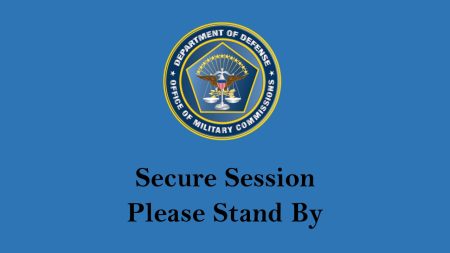
Court is back in session. Ms. Morgan, defense lawyer, is asking about the process of preparing a report of the interrogation of Khallad in 2007.
Emley agrees that allegations of CIA abuse were segregated in a second document, not included in the account of their interrogation.
Ms. Morgan: Did that then or does that now seem strange to you?
Prosecutor Ryan: Objection.
Ms. Morgan: Goes to voluntariness.
Judge Acosta: Overruled.
Agent Emley: The whole process was unique and singular in my professional experience.
He says his focus was documenting the event for law enforcement purposes, getting it right.
Ms. Morgan: You told Khallad you didn’t work for CIA. He asked about your agencies, FBI and NCIS. What’d you say?
Agent Emley: I provided him with the best Wikipedia definition I could provide … on the roles and responsibilities of an NCIS agent,” mentioned jurisdiction, UCMJ.
A little bit of context: Ms. Morgan is asking questions from the Guantanamo courtroom, talking to the witness on a screen. The judge is also in the Gitmo court. Agent Emley is testifying from the Remote Hearing Room in Crystal City, Virginia — a classified secondary courtroom.
Research Tools: If there is interest in obtaining trial transcripts or any other GTMO information, the Office of Military Commissions website is as follows: https://www.mc.mil/home.aspx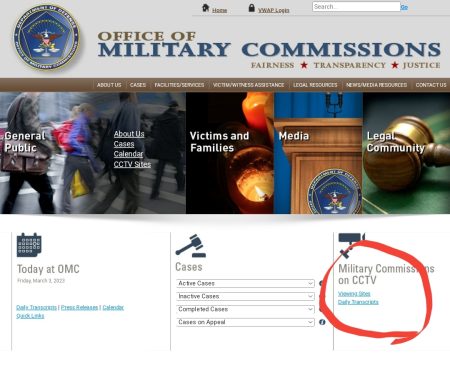
News Stories Researched and Posted by our Team of Volunteer Citizen Journalists
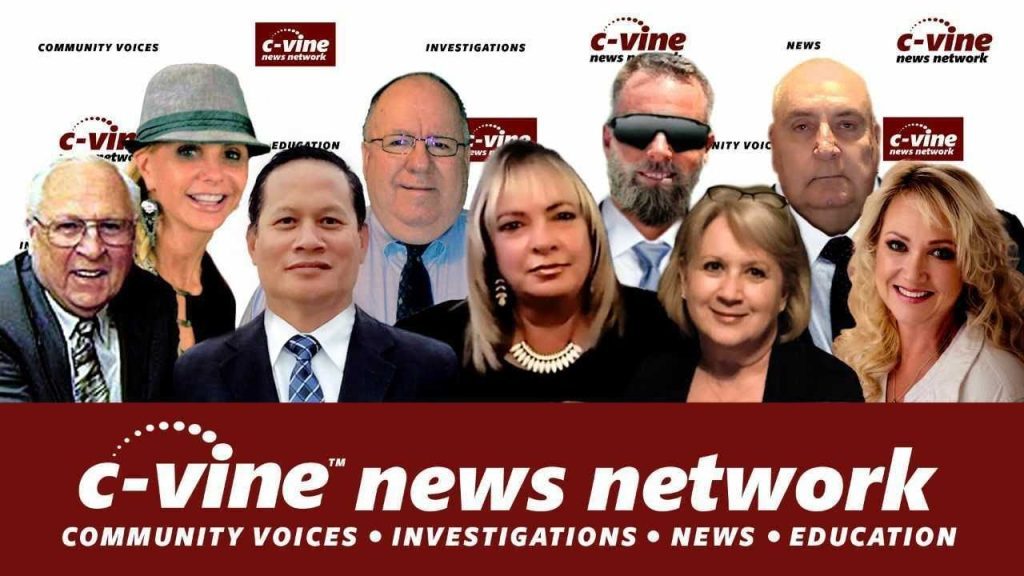
Like this:
Like Loading...

